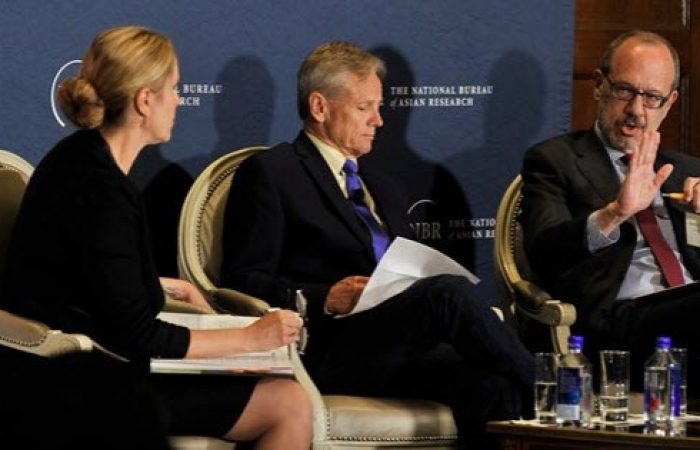On June 18th, 2019, ICAS attended the Asia Policy Assembly, the annual conference of the National Asia Research Program, co-organized by the National Bureau of Asian Research (NBR) and the National Security Studies at the National Defense University (NDU). This is a summary of the keynote address and the plenary session on the first day of the Asia Policy Assembly 2019.

Senator Gardner delivering Keynote Address. Photo Credit: NBR
Keynote Address
Senator Cory Gardner’s Keynote Address began by expressing the importance of the value of democracy, which he described as the most important factor in the Indo-Pacific Strategy, and to great power competition faced by the United States. Gardner defined China as a rising power that seeks to provide the world with an alternative perception and an alternative system that challenges universal liberal democratic values. He concluded that China’s current commitment to international law is merely superficial, following only those which serve Chinese interests. In order to counter China’s aggressive behavior towards the international system, the Senator noted that he has been pushing for the National Defense Authorization Act, which seeks to empower U.S. military capabilities to cope with the rising threat from the “authoritarian regime” that rules China.
In regard to U.S. partners and countries on the periphery of China, the Senator commended democracy in Taiwan and suggested that it should be preserved through closer cooperation between the U.S. and Taiwan. Senator Gardner said that he personally believes that the United States should honor the Taiwan Relations Act and to make routine the sale of arms to Taiwan in order to help democratic Taiwan to defend itself from coercion by mainland China. When asked about U.S. relations with Vietnam, Senator Gardner showed great optimism in future cooperation between the United States and Vietnam, especially in the South China Sea region.
Plenary Session: U.S.-China Strategic Competition
The Plenary Session: U.S.-China Strategic Competition was moderated by Laura Junor from the National Defense University. NBR President Richard Ellings and Princeton University Professor Aaron Friedberg were the speakers.

Dr. Ellings and Moderator Dr. Laura Junor. Photo Credit: NBR
The plenary session began with a discussion on U.S. objectives in China. Dr. Friedberg suggested that there has yet to be a fully-formed consensus around U.S. strategy towards China. The U.S., according to Dr. Friedberg, had only reached a consensus over what the nature of the threat and the challenge to the international system is: the authoritarian structure of China’s government and its history. Dr. Ellings agreed with Dr. Friedberg’s opinion and added that the United States had a coherent China strategy after rapprochement, but failed to influence China into becoming more liberal and democratic through market reform. Since China’s system of governance was less influenced by the United States, it continued to grow as a threat to the international system as it is not a country with a liberal democratic foundation.
Looking back in history, both Dr. Ellings and Dr. Friedberg agreed on the fact that the United States’ political system was designed to prevent the state from mobilizing national power for unified goals, which is the opposite of what the Chinese system is designed for. Both of them also agreed that in crises, such as the Japanese attack on Pearl Harbor, the U.S. system enabled the government to mobilize its power with a unified public base to react against Japanese aggression. Therefore, they concluded that the United States, through history, requires setbacks to build consensus around a problem, with a high level of preparedness and commitment to the issue. However, they also agreed that the threat from China is very different from that of Japan in the 1930s. Dr. Ellings suggested that the U.S.’ ability to mobilize quickly against Japanese aggression in the 1930s was based on the U.S.’ strong manufacturing industry, which has declined immensely today. Therefore, both of them agreed that should China instigate a military crisis against the United States, the ability for the U.S. to mobilize quickly and conduct a proper response to the threat may not be sufficient. However, the speakers noted that U.S. policymakers have built a consensus over the threat of China in recent years, which is an important foundation for an effective strategy to deal with the threat of China.
In discussing the difficulties of dealing with the China threat to the United States and to the international system, both Dr. Ellings and Dr. Friedberg agreed that it is far more complicated than dealing with the Soviet Union during the Cold War, given China’s place in global supply chains. With the majority of international companies establishing and expanding their production in China, U.S. economic capacity, which is an important factor in U.S.-China competition, is diminishing. Therefore, it is critical, according to the two speakers, to boost U.S. economic capacity. As a major step towards boosting U.S. economic capacity, the speakers believe that the U.S. should convince and encourage international businesses to disengage from China. As long as the international business community remains heavily dependent on China’s role in international supply chains, the U.S. supply chain will be vulnerable.
The speakers called for a re-orientation of the global economy which, from their view, will also benefit the global economy in the long run. Dr. Ellings was of the view that Chinese businesses in all sectors and industries are ultimately tied to and controlled by the Chinese Communist Party (CCP), which seeks to boost its control in China and China’s relative standing with other countries through elevating China’s economic status. It is, Dr. Friederg said, impossible to think that China seeks to change the status quo because it is the very status quo that has benefited China since its “Reform and Opening Up”. Therefore, the speakers suggested that it must be the United States that starts pushing for disentanglement and disengagement as a means to diminish China’s footprint within the international economy.

Dr. Friedberg and Dr. Ellings. Photo Credit: NBR
To further explain the extent of the threat that China poses to the international economy, the speakers emphasized China’s IP theft problem, suggesting that it did not start recently but was a serious issue since the beginning of rapprochement. Dr. Ellings suggested that China’s strategy has been very consistent over time, every step in China’s technological and business development has been highly coordinated with China’s political and security needs. China’s model, i.e. to resurrect the ‘Middle Kingdom’ through expanding control of the CCP and to enhance China’s relative power against other countries, was not invented by China’s current president Xi Jinping but is a continuation of his predecessors’ beliefs and strategies. The speakers warned about the danger of China’s IP theft as it badly endangers U.S. business and national security.
On the alignment between China and Russia, the speakers discussed the danger of an “alliance” between China and Russia and suggested that it is hard to disengage China and Russia at this point. Dr. Ellings suggested that China and Russia, unlike in the Cold War era, are not allied based on a common ideology – Communism. On the contrary, Dr. Ellings suggested, what binds China and Russia together is an anti-ideology, the opposition to liberal democracy and universal values. The speakers also suggested that both China and Russia need tension with the West for domestic purposes right now, which makes decoupling China and Russia very difficult. This alliance, as the speakers emphasized, is the biggest threat to the United States as they divide U.S. power into two separate regions: Europe and the Asia-Pacific. But Dr. Ellings believes that deterring Russia first is the key to containing the threat from a potential China-Russia alliance. Paralleling China-Russia alliance to the Germany-Japan axis in the Second World War, Dr. Ellings suggested that Russia, as a declining power, had about the same relative power to the United States as Japan during the dawn of the Second World War. If the U.S. could have deterred Japan before it started to expand into Southeast Asia and later attacked Pearl Harbour, the U.S. could have focused its power on Germany in the 1940s, according to Dr. Ellings. He suggested that the U.S. should wave its stick and deter Russia in Europe in order to protect U.S. allies in the region, while giving Russia the carrot to pursue its interest in the Asia Pacific. Dr. Ellings believes that being tough on Russia early on could prevent the division of U.S. capability and could help dissolve the potential threat brought about by a China-Russia alliance.
The plenary session ended with guests questioning a potential liberal democratic movement against the Chinese Communist Party in China. The speakers dismissed the possibility of a “revolution” and suggested that unlike the Soviet Union, where people were hungry for information and ideologies from the liberal world, most people in China are largely un-impacted by such information even if the liberal world breaches through China’s “Great Firewall” from time to time. The speakers suggested that the CCP’s centralized control has manipulated Chinese public view against the liberal world’s ideologies, and therefore the origins of the China threat stems from the CCP and its authoritarian administration.
Yilun Zhang is a research associate and administrative assistant at ICAS. He obtained his M.A. in International Relations with a concentration on International Political Economy from Johns Hopkins University SAIS




